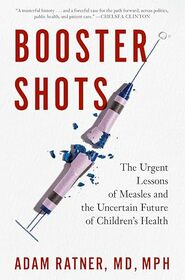Helpful Score: 1
Booster Shots contains an amazing amount of information for a book that is a bit more than 200 pages. Dr. Ratner describes his own experience as a researcher and pediatrician specializing in infectious diseases, and personalizes the diseases by describing particular patients. He gives a chapter-long history of how measels was determined to spread from person to person, and covers the history of vaccine development. (To be honest I skimmed those chapters, but readers interested in the history of medicine and clinical research will enjoy them).
As Dr. Ratner gives a timeline of how the number of measels cases in the US waxes and wanes, it is clear that there is a correlation with what political party was in power. However, the author is careful to not make this a political book and instead describes the state of the country at the time, gives the numbers, then lets the reader draw their own conclusion. I think this is a positive thing as hopefully more people will read this book and be receptive to its contents since it is not explicitly partisan.
The book devotes a lot of time to vaccine hesitancy, and shows that concerns (both valid and nonsense) about vaccines have been deliberately introduced to vulnerable and susceptible groups, which of course results in outbreaks within these groups. He does not hesitate to call out those in his own profession such as Andrew Wakefield (though thankfully Wakefield is not in the same profession anymore), celebrities, and leaders of the anti-vax movement for spreading misinformation and disinformation. Quite a bit is said about RFK, Jr. and his courting of Trump during Trump's first presidancy.... well, here we are.
Since COVID-19 vaccines have become an emotionally charged issue for many, with social media fanning the flames. Dr. Ratner gives examples of how to combat vaccine information and increase vaccine uptake both on a personal level (spoiler alert: threatening to report someone to social services for child neglect on Facebook is not constructive, so instead have a series of conversations always coming from a place of empathy and understanding that the parent is doing what they understand to be necessary to keep the child healthy), and through programs run by the state and federal governments and NGOs.
This book is (sadly) very timely, and is written in a way that is accessible to a general audience. Highly recommended.
As Dr. Ratner gives a timeline of how the number of measels cases in the US waxes and wanes, it is clear that there is a correlation with what political party was in power. However, the author is careful to not make this a political book and instead describes the state of the country at the time, gives the numbers, then lets the reader draw their own conclusion. I think this is a positive thing as hopefully more people will read this book and be receptive to its contents since it is not explicitly partisan.
The book devotes a lot of time to vaccine hesitancy, and shows that concerns (both valid and nonsense) about vaccines have been deliberately introduced to vulnerable and susceptible groups, which of course results in outbreaks within these groups. He does not hesitate to call out those in his own profession such as Andrew Wakefield (though thankfully Wakefield is not in the same profession anymore), celebrities, and leaders of the anti-vax movement for spreading misinformation and disinformation. Quite a bit is said about RFK, Jr. and his courting of Trump during Trump's first presidancy.... well, here we are.
Since COVID-19 vaccines have become an emotionally charged issue for many, with social media fanning the flames. Dr. Ratner gives examples of how to combat vaccine information and increase vaccine uptake both on a personal level (spoiler alert: threatening to report someone to social services for child neglect on Facebook is not constructive, so instead have a series of conversations always coming from a place of empathy and understanding that the parent is doing what they understand to be necessary to keep the child healthy), and through programs run by the state and federal governments and NGOs.
This book is (sadly) very timely, and is written in a way that is accessible to a general audience. Highly recommended.




